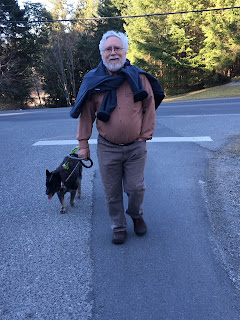 |
| Cracks Appearing* |
Other than that we haven't left home and our immediate neighbourhood. We haven't seen friends or family members.
We are very fortunate in that we are both retired, and therefore not worried about having to work or about loss of pay. We have a roomy home and yard, and because we live in a semi-rural area, we can walk on the streets and trails nearby, seldom encountering anyone.
Also, we are both people with many solitary interests. During normal times, neither of us has any difficulty entertaining ourselves for hours and days at a time, for example, me with writing, reading, gardening, and academic work, and Rob with woodworking, reading, outdoor projects, and watching movies.
And yet.
These are not normal times. We are living through a cataclysmic event affecting the whole world -- a pandemic. There is an ongoing media barrage showing us the mounting number of cases and deaths around the world. It is frightening as we contemplate the extent of human suffering; worry about health care workers, family, and vulnerable friends; and wonder whether our own lives are at risk.
I have found it hard to pull myself away from reading and watching coronavirus news stories. I have an irrational feeling that if I'm not tracking the news constantly, it will get worse the minute I look away.
Witnessing the progress of the pandemic, while also being sequestered at home and having all of our usual activities come to a halt, is stressful. It's also hard on relationships, and on individual mental well-being.
J.P. Sears recently posted a funny video called How to Destroy Your Relationship During the Quarantine, which you can watch by clicking here.
The video is funny, but the stresses on relationships are real.
Parents staying at home with children who are not in school or daycare may be trying to work from home while also finding ways to keep the kids who have been cut off from their friends and usual activities engaged, or at least not fighting with each other. Grandparents who otherwise could provide respite are in the demographic most at risk from the virus.
Children absorbing bits of the news may be anxious and fearful, and express their feelings by acting out.
Young people who are dating but not living in the same household may be struggling to hold their relationship together or tempted to ignore physical distancing.
The sandwich generation may be worried sick about their elderly parents on the one hand and their kids and jobs on the other.
Couples may find that the texture of their relationship has changed. Many of the activities and routines they enjoyed together are no longer available. Each may be responding to the crisis in a different way, or be in a different stage of coping. For example, one may be in avoidance mode while the other is seeking extra closeness and reassurance. Or one may be full of plans for new activities while the other can't drag him/herself off the couch.
The stresses can be extreme when struggling to work from home, or if a loved one is ill, or if the financial consequences for the family are dire, or if one or both are health care workers or in another essential service that puts them at greater risk.
People who already live alone may find self isolating especially hard, as their usual social resources are no longer available.
The little voice in the head might start saying things like:
I've discovered I actually don't like my family at all.
Why can't these little fiends give me even one single minute of peace and quiet?
He/she spends every single minute staring at their computer and doesn't even talk to me.
We have nothing in common.
He/she turns everything into a big emotional drama that is all about him/herself.
What's wrong with me -- I can't concentrate on anything!
It's normal to feel strong emotions during a crisis situation like this. And, as strange as it may seem, the challenges we are all facing present an opportunity.
We have the opportunity to be kind to ourselves and to be kind to each other. We have the opportunity to open up to each other and deepen the relationship with our partner in ways we may not take the time for during our regular schedule. We have the opportunity to really enjoy being with our family members rather than passing like ships in the night as each one races off to work, school, or other activities. Children have an opportunity to learn to be more considerate of their parents and to develop a more caring relationship with their siblings. We all have an opportunity to reach out to people we know, and especially to people who may be lonely or in need of extra support.
With a heightened sense of the value of life we have now that our mortality is staring us in the face, each one of us can pause and take a long look at this beautiful planet we inhabit and be grateful for the life all around us right now.
 |
| Life and Creativity Thrive in Cracks* |














